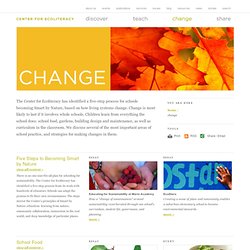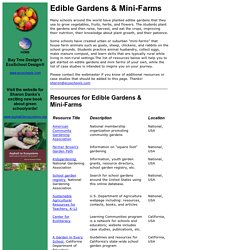

Change. Five Steps to Becoming Smart by Nature view all content > There is no one-size-fits-all plan for schooling for sustainability.

The Center for Ecoliteracy has identified a five-step process from its work with hundreds of educators. New Stories From 'Urban Agriculture Notes'. EcoSchool Design: Edible Gardens and Mini-Farms. Many schools around the world have planted edible gardens that they use to grow vegetables, fruits, herbs, and flowers.

The students plant the gardens and then raise, harvest, and eat the crops, improving their nutrition, their knowledge about plant growth, and their patience. Some schools have created urban or suburban "mini-farms" that house farm animals such as goats, sheep, chickens, and rabbits on the school grounds. Students practice animal husbandry, collect eggs, make manure compost, and learn skills that are typically rural while living in non-rural settings.The list of resources below will help you to get started on edible gardens and mini farms of your own, while the list of case studies is intended to inspire you on your journey.
Please contact the webmaster if you know of additional resources or case studies that should be added to this page. Thanks! Social Planning, Food Policy, Key Initiatives.